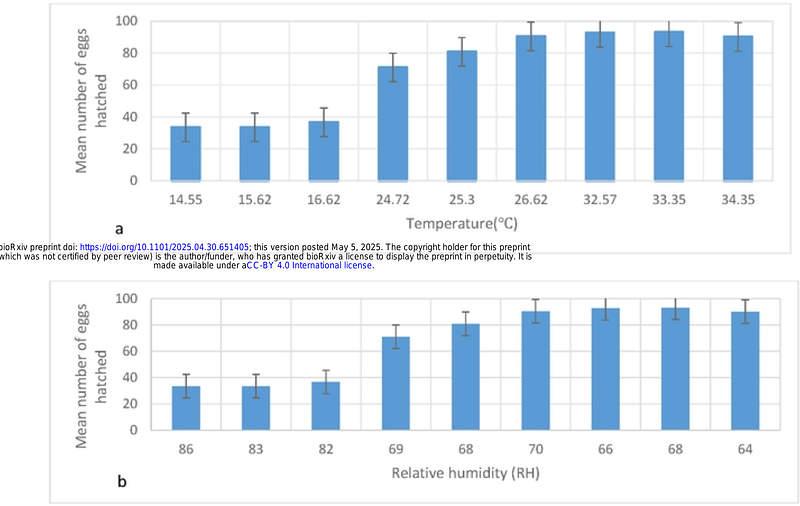The influence of Temperature and Relative Humidity on the Development and Survival of Laboratory-Reared Anopheles arabiensis in Ethiopia

The influence of Temperature and Relative Humidity on the Development and Survival of Laboratory-Reared Anopheles arabiensis in Ethiopia
Erana, T.; Kebede, A.; Deressa, C. T.; Yewhalaw, D.; Simma, E. A.
AbstractMalaria, a major vector-borne disease transmitted by female Anopheles mosquitoes, remains a critical public health challenge in tropical and subtropical regions. Climate change influences vector distribution, abundance, and disease transmission patterns. This study examined the influence of temperature and humidity on the development, abundance, and survival of Anopheles arabiensis, a key malaria vector in Ethiopia. Laboratory reared susceptible An. arabiensis strain mosquitoes were reared under varying conditions, with 400 eggs exposed to temperatures of 14.5-34.35{degrees}C and relative humidity (RH) levels of 64-84% and compared with the ones that reared under standard insectary conditions. Development and survival rates were analyzed across 20 temperature-humidity regimes using SPSS 26, with linear regression, OLS, and quadratic regression models. Results showed optimal egg hatchability (80%) at 25.3-34.35{degrees}C and 64-68% RH. Adult emergence peaked (80%) at 28.37-29.65{degrees}C and 70% RH, but declined significantly below 16{degrees}C and 64% RH. The longest larval development (13 days) occurred at 14.55-15.62{degrees}C and 83-86% RH, while adult survival reached 25 days at 23.65-24.72{degrees}C and 68-69% RH. These findings highlight the profound influence of temperature and humidity on An. arabiensis life stages, emphasizing their role in mosquito population dynamics. Further research is needed to explore how these factors affect malaria parasite development within vectors, offering insights to improve malaria control strategies.